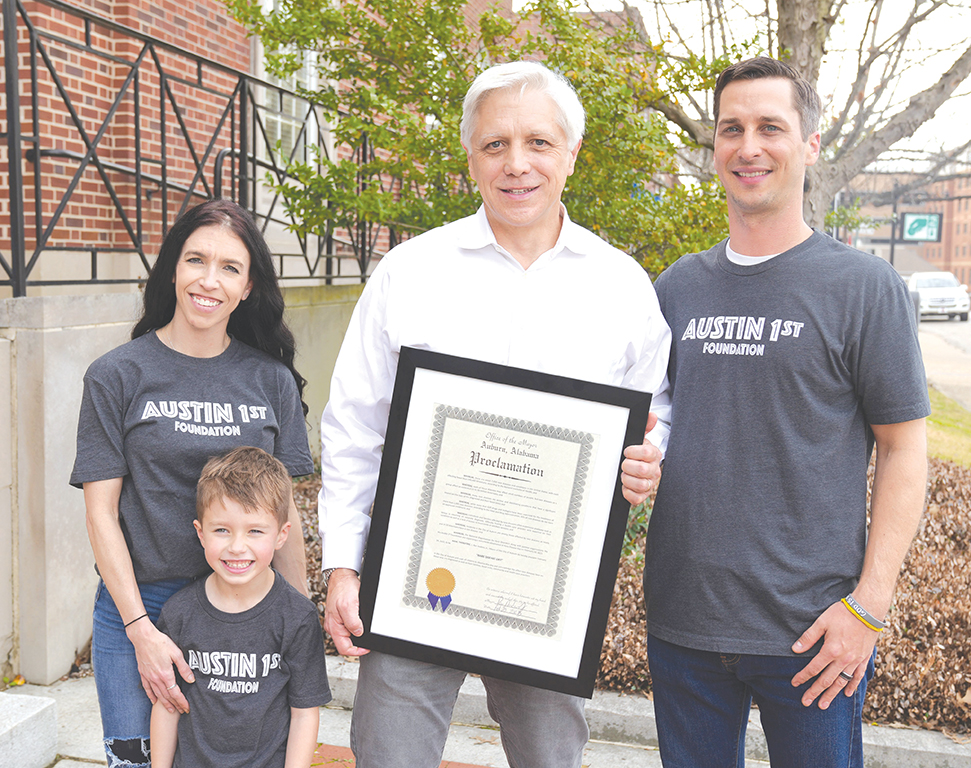Auburn Mayor Ron Anders (center) presented a proclamation to the Terling family for Rare Disease Day.
CONTRIBUTED TO THE OBSERVER
AUBURN —
Rare Disease Day is an annual awareness day dedicated to elevating public understanding of rare diseases and calling attention to the special challenges people face — and it is as important in Auburn as anywhere across the globe.
Anthony and Lindsey Terling are residents of Auburn and have raised their two sons in the city since birth. Their oldest son, Austin, was born with an ultra-rare disorder, and through a 501(c)(3) public charity they co-founded in his honor — Austin 1st Foundation Inc. — they have been raising awareness and support for those affected by rare disease through Austin’s story.
Family and friends of the Austin 1st Foundation took part in a global movement for Rare Disease Day on Feb. 28, and a signed proclamation by Mayor Ron Anders and the city of Auburn officially made Feb. 28, 2023, Rare Disease Day in Auburn.
“The city of Auburn and I are proud to support the Austin 1st Foundation and the Terling family with this proclamation signing that creates awareness for those living with a rare disease in our community and nationwide,” Anders said.
Anthony “Austin” Terling Jr. peacefully passed away at his home in July 2022. He was born in June 2013 with a rare, genetic disease known as UBA5 Mutation. His condition is only known to be diagnosed in 40 to 50 people worldwide. It took four years for Austin to receive his diagnosis. Typically, it takes five years or more to receive a correct rare disease diagnosis.
Although Austin’s years were limited on this earth, the number of lives he touched and positively impacted was not. Austin required 24/7 medical care his entire life and suffered from numerous physical and cognitive issues related to the mutation of his UBA5 gene.
Motor control issues included hypotonia (floppiness), spasticity (stiffness) and movement disorders. Cognitive issues included seizures, intellectual disability and brain abnormalities. Growth issues included microcephaly (poor head growth) and failure to thrive. To paint a clear picture, Austin was never able to reach any major milestones in his development from birth to his last days on this earth. He never rolled over, crawled, sat up, walked, talked or anything without 100% help from his family or team of caregivers.

“Words can’t express the impact Austin made on our lives and so many others, even those that never met him,” Anthony said. “His memory and legacy will continue to live on through the charitable work of the Austin 1st Foundation.”
According to the National Institutes of Health (NIH), a disease is rare if it affects less than 200,000 people in the United States. Over 25 million Americans live with a rare disease — and nearly half of those patients are children. Out of more than 7,000 known rare diseases, 90% are still without FDA-approved treatments. All pediatric cancers are rare, and there are over 500 rare cancers in general.
Wear blue in memory of Austin and for all people living or who have lived with a rare disease. The community is encouraged to post on social media how they are supporting and raising awareness for rare disease by tagging @Austin1stFoundation with the hashtags #CareAboutRare #Austin1st.
Rare Disease Day is marked globally every year on the last day of February — the rarest date on the calendar — to underscore the nature of rare diseases and the challenges patients face. Rare Disease Day is sponsored in the United States by the National Organization for Rare Disorders (NORD), the leading independent, nonprofit organization committed to the identification, treatment and cure of rare diseases.
For more information about Austin’s story and the Austin 1st Foundation mission, visit austin1stfoundation.org. For more information about Rare Disease Day in the U.S., visit rarediseaseday.us.

